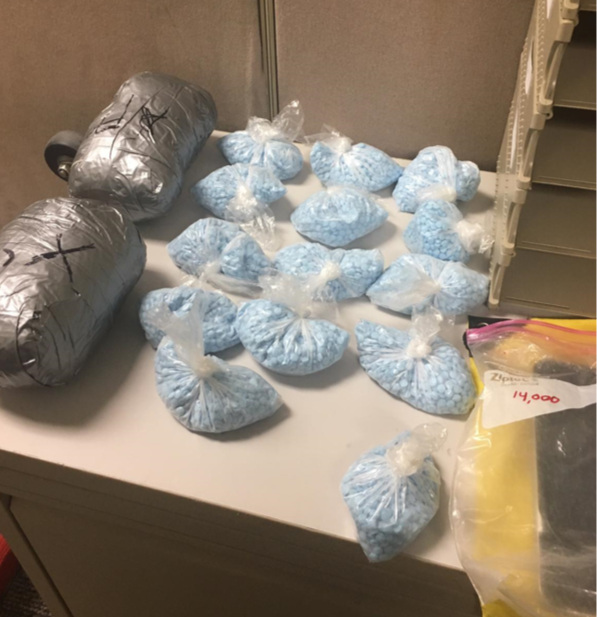‘Mexican Oxy’ Flooding U.S. Black Market
/By Pat Anson, PNN Editor
New York City police and DEA agents have announced the seizure of 20,000 counterfeit oxycodone pills made with illicit fentanyl. The pills, which have an estimated street value of $600,000, are blue in color and stamped “M” on one side and “30” on the other, making them virtually indistinguishable from prescription oxycodone.
The fentanyl pills are believed to have originated in Mexico. Known on the street as “Mexican Oxy,” the highly potent counterfeit pills are often cheaper and easier to obtain than pharmaceutical-grade oxycodone. Black market 30 mg oxycodone pills sell on the street for $9 to $30 each and are surfacing around the country.
“If you take prescription pills that did not come directly from a pharmacy, you are risking your life,” said New York City Special Narcotics Prosecutor Bridget Brennan. “Throughout New York City, we have seen a spate of cases involving tens of thousands of potentially lethal fentanyl pills masquerading as oxycodone.
“Just because black market pills have the same color and design as legitimate pills, it does not mean they are safe. The ingredients and potency are all unknown, and minuscule amounts of fentanyl can cause overdose or death. Consuming a counterfeit pill is akin to playing Russian Roulette.”
Overdose deaths in New York City are at record-high levels and fentanyl is involved in over half of them. Fentanyl is a synthetic opioid 50 to 100 times more potent than morphine. A customer accustomed to taking oxycodone would not necessarily have the tolerance to ingest illicit fentanyl without suffering an overdose.
DEA PHOTO
Fentanyl powder is typically produced by illicit labs in China and then smuggled into the U.S. through Mexico. The powder is transformed into tablets by pill presses purchased online and then sold by drug traffickers. Four arrests in New York were made in connection with the latest seizure.
“These arrests highlight a growing trend in illicit street drugs which increases the risk of drug overdose,” said DEA Special Agent in Charge Ray Donovan. “Traffickers are mass producing pseudo-pharmaceutical pills made of heroin, fentanyl and other illicit drugs in makeshift laboratories throughout New York City. These pills attract users because they are more convenient and less conspicuous; but users should beware because they are unregulated and lethal.”
Fentanyl Seizures at Mexican Border
Mexican Oxy is also blamed for a rash of overdoses in Arizona, where fentanyl deaths have tripled in recent years.
“It’s the worst I’ve seen in 30 years, this toll that it’s taken on families,” Doug Coleman, DEA Special Agent in Charge of Arizona told the Associated Press. “The crack (cocaine) crisis was not as bad.”
Last month, the U.S. Border Patrol announced its biggest fentanyl seizure ever — over 250 pounds were found in a truckload of cucumbers at a border crossing in Nogales, Arizona.
Most of the fentanyl was in powder form and over two pounds were made up of pills. Together, they had the potential to kill millions of people.
“Just because black market pills have the same color and design as legitimate pills, it does not mean they are safe.”
Most of the fentanyl seized by law enforcement is found hidden inside vehicles at official border crossings around Nogales and San Diego, according to the AP. Smaller shipments of fentanyl are sent directly to the U.S. from China through the mail. The Postal Service’s Inspector General recently reported that over 90 percent of illegal online pharmacies use the mail to ship illicit drugs.
The Postal Service is prohibited from opening packages without a search warrant and is obligated to accept inbound international mail. This makes it more difficult for postal inspectors to identify and track packages suspected of containing illicit drugs. By comparison, private carriers are able to open and inspect packages and can track shipments from beginning to end.
The Inspector General recommended that Congress pass legislation that would give postal inspectors authorization to open and inspect domestic packages suspected of carrying illicit drugs.




